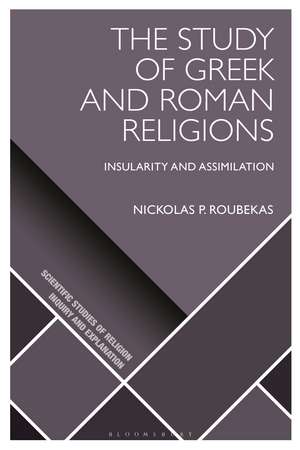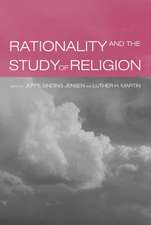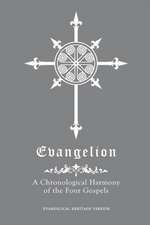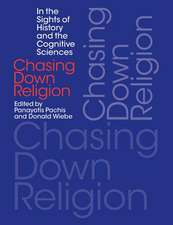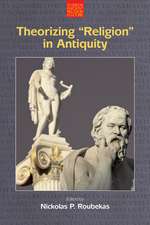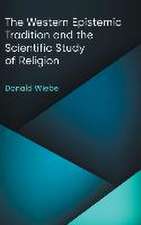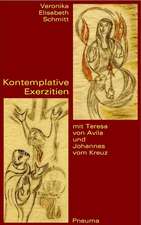The Study of Greek and Roman Religions: Insularity and Assimilation: Scientific Studies of Religion: Inquiry and Explanation
Autor Dr Nickolas P. Roubekasen Limba Engleză Paperback – 21 feb 2024
| Toate formatele și edițiile | Preț | Express |
|---|---|---|
| Paperback (1) | 190.06 lei 6-8 săpt. | |
| Bloomsbury Publishing – 21 feb 2024 | 190.06 lei 6-8 săpt. | |
| Hardback (1) | 538.67 lei 6-8 săpt. | |
| Bloomsbury Publishing – 10 aug 2022 | 538.67 lei 6-8 săpt. |
Din seria Scientific Studies of Religion: Inquiry and Explanation
- 22%
 Preț: 149.02 lei
Preț: 149.02 lei - 23%
 Preț: 192.55 lei
Preț: 192.55 lei - 30%
 Preț: 511.64 lei
Preț: 511.64 lei - 23%
 Preț: 191.75 lei
Preț: 191.75 lei - 21%
 Preț: 218.65 lei
Preț: 218.65 lei - 21%
 Preț: 218.09 lei
Preț: 218.09 lei - 23%
 Preț: 229.41 lei
Preț: 229.41 lei - 13%
 Preț: 194.06 lei
Preț: 194.06 lei - 24%
 Preț: 190.16 lei
Preț: 190.16 lei - 21%
 Preț: 217.91 lei
Preț: 217.91 lei - 13%
 Preț: 237.57 lei
Preț: 237.57 lei - 22%
 Preț: 231.63 lei
Preț: 231.63 lei - 24%
 Preț: 190.06 lei
Preț: 190.06 lei - 23%
 Preț: 191.67 lei
Preț: 191.67 lei - 23%
 Preț: 191.38 lei
Preț: 191.38 lei - 22%
 Preț: 238.11 lei
Preț: 238.11 lei - 30%
 Preț: 596.81 lei
Preț: 596.81 lei - 22%
 Preț: 225.12 lei
Preț: 225.12 lei - 21%
 Preț: 217.82 lei
Preț: 217.82 lei - 22%
 Preț: 237.93 lei
Preț: 237.93 lei - 22%
 Preț: 256.20 lei
Preț: 256.20 lei - 23%
 Preț: 191.38 lei
Preț: 191.38 lei - 23%
 Preț: 255.66 lei
Preț: 255.66 lei - 30%
 Preț: 512.37 lei
Preț: 512.37 lei - 13%
 Preț: 257.03 lei
Preț: 257.03 lei - 30%
 Preț: 511.07 lei
Preț: 511.07 lei - 30%
 Preț: 717.79 lei
Preț: 717.79 lei
Preț: 190.06 lei
Preț vechi: 248.67 lei
-24% Nou
Puncte Express: 285
Preț estimativ în valută:
36.37€ • 37.83$ • 30.03£
36.37€ • 37.83$ • 30.03£
Carte tipărită la comandă
Livrare economică 14-28 aprilie
Preluare comenzi: 021 569.72.76
Specificații
ISBN-13: 9781350336247
ISBN-10: 1350336246
Pagini: 192
Dimensiuni: 156 x 234 x 25 mm
Greutate: 0.27 kg
Editura: Bloomsbury Publishing
Colecția Bloomsbury Academic
Seria Scientific Studies of Religion: Inquiry and Explanation
Locul publicării:London, United Kingdom
ISBN-10: 1350336246
Pagini: 192
Dimensiuni: 156 x 234 x 25 mm
Greutate: 0.27 kg
Editura: Bloomsbury Publishing
Colecția Bloomsbury Academic
Seria Scientific Studies of Religion: Inquiry and Explanation
Locul publicării:London, United Kingdom
Caracteristici
Addresses multiple recognized problems known to scholars of classics and religious studies, such as the place of 'belief' in the study of religions of the past
Notă biografică
Nickolas P. Roubekas is Assistant Professor of Religious Studies at the University of Vienna, Austria. His previous publications include An Ancient Theory of Religion: Euhemerism from Antiquity to the Present (2017), Theorizing "Religion" in Antiquity (2018), Explaining, Interpreting, and Theorizing Religion and Myth (2020), and The Wiley Blackwell Companion to the Study of Religion (2nd ed., 2021). He is editor-in-chief of NUMEN: International Review for the History of Religions.
Cuprins
Acknowledgments 1. "Closing a Book None the Wiser"; Or Should a Scholar of Religion Happen to Meet a Classicist 2. Burning Bridges? 3. (No) Greek and Roman "Religions" 4. Comparative Nausea 5. The Departing Gods 6. Re(ap)proaching the Study of Greek and Roman Religions Appendix I-Re: Hesiod Appendix II-On Belief Appendix III-A Typology of Religions References Index
Recenzii
This book is one of a kind. Nickolas P. Roubekas successfully demonstrates how Greek and Roman religions have been historically studied in a one-sided manner. Consequently, he offers appealing and innovative discussions on how this could be amended, primarily by suggesting a more inter-disciplinary collaboration, which includes the findings of the cognitive science of religion.
An interdisciplinary approach to the study of ancient religion is often invoked, but seldom seriously implemented. This book is a valuable reflection on the necessity to build real bridges between classics and religious studies, dwelling deeply on the recent history of both disciplines, their prejudices, and their self-limiting boundaries. Even those who do not share Roubekas' proposals will profit from his clear, thorough, and honest discussions of scholarship.
An interdisciplinary approach to the study of ancient religion is often invoked, but seldom seriously implemented. This book is a valuable reflection on the necessity to build real bridges between classics and religious studies, dwelling deeply on the recent history of both disciplines, their prejudices, and their self-limiting boundaries. Even those who do not share Roubekas' proposals will profit from his clear, thorough, and honest discussions of scholarship.
